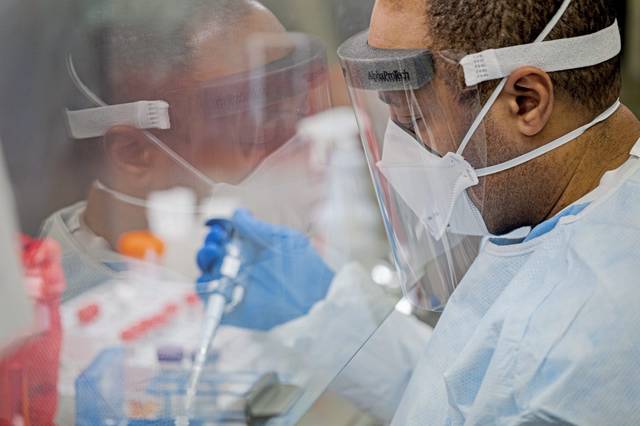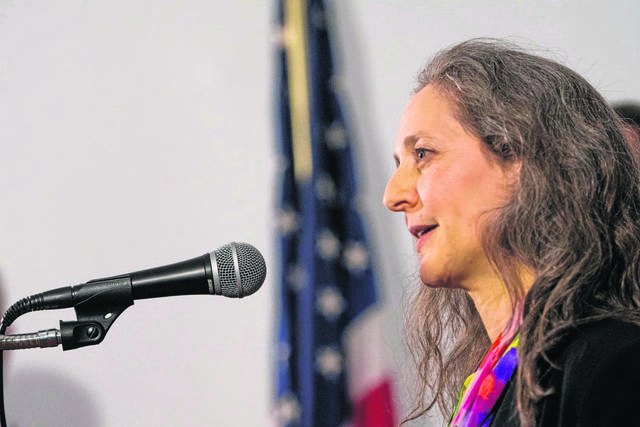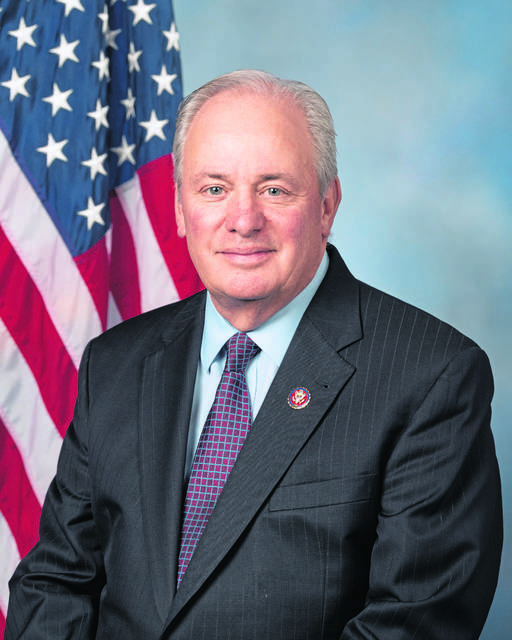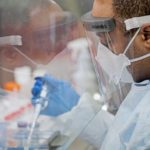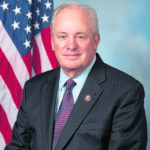Forty percent to 60% of Western Pennsylvanian adults could get infected with covid-19 before the coronavirus pandemic winds down, Allegheny County Health Director Dr. Debra Bogen said Tuesday.
“Most people who get the virus will actually do fine,” Bogen said. “The whole point of everything we are doing is to decrease the rate at which we spread that virus.”
Bogen discussed the sobering estimate during a telephone-townhall Tuesday evening open to the public hosted by U.S. Rep. Mike Doyle, D-Forest Hills. Participating were Allegheny County Executive Rich Fitzgerald and Dr. Richard Beigi, president of UPMC Magee-Womens Hospital.
A woman on the call said she was worried her two daughters, who work at a pharmacy, are bound to get covid-19. Bogen replied that while health care workers on the front lines should take extra care, global data indicates the majority of the people in this region may become infected.
Bogen spoke on the call from a room with other health and public officials.
“Sadly, eventually, everyone in this room, or at least half of us in this room, probably will get this infection,” Bogen said. “However, hopefully we will spread out how quickly we get that infection.”
The local estimate is in line with prior estimates by epidemiologists regarding places such as Italy and on a global scale.
Pennsylvania Department of Health Secretary Dr. Rachel Levine warned earlier in the day that cases will spike in coming weeks and months.
The state has confirmed at least 96 cases, which do not include commercially tested cases. Nearly 900 patients tested negative.
As of Tuesday night, Allegheny County has reported at least seven cases, Washington County has two and Beaver County has one.
Confirmed cases are expected to climb in almost every part of the United States as testing efforts ramp up.
“This is not a sprint,” Bogen said. “This is going to be an ultra-marathon.”
Bogen reiterated that those at most risk of contacting severe symptoms or dying of the covid-19 disease are the elderly and people with underlying health conditions.
Officials urge anyone who is sick to stay home and wear a mask if they must go out in public.
Healthy individuals who keep a distance of six feet from others do not need to wear masks.
Doyle hosted the telephone-townhall as a chance for members of the public to ask questions and get answers from experts.
“We all have the responsibility to take precautions … and not be someone who spreads this virus,” Doyle said. “This situation is evolving rapidly, public policy is evolving rapidly and we want to keep you up to date.”
Participants included callers from places including Pittsburgh’s East Liberty, North Braddock, Scott, Forest Hills and North Versailles.
Here are some of the questions raised by concerned constituents:
Q: How many have been tested for covid-19 in Allegheny County?
A: As of last week, the county’s testing numbers were only in the “teens to 20s,” Bogen said.
The rate of testing is expected to increase dramatically in coming weeks amid relaxed federal regulations and as health care providers and commercial labs roll out more testing options, such as drive-thru and pop-up facilities.
Including commercial labs, the county now has processed “easily a couple hundred tests,” Bogen said.
“Sample collection and testing is going to increase over the next week or two,” she said.
Q: Can I be tested?
A: If you have covid-19 symptoms — fever, shortness of breath and worsening cough — yes, you should call your primary care physician or explore other testing options becoming available.
Those who do not have symptoms likely will be turned away to prioritize testing those who do.
UPMC began testing at a facility in Pittsburgh’s South Side on Tuesday, but “there’s just not the capacity for everybody to be tested,” Dr. Beigi said.
“We basically invented or created this test internally, so we want to make sure we are getting this right,” he said. The work involves not only the collection of samples in the South Side facility but also their safe transportation to and processing at UPMC’s labs in Oakland.
The tests will not show a positive result until the illness is present, and symptoms usually happen within about 24 hours of contracting it.
“There’s no point in being tested before you’re sick,” Bogen said.
Q: What about people who want to get tested but don’t have health insurance?
A: Anyone who qualifies for a test based on their symptoms should not have to pay, Doyle said. He referenced legislation that passed the U.S. House last week and is making its way through the Senate will guarantee the protection nationwide.
UPMC and Allegheny Health Network also have committed to offering free testing for the uninsured.
“If you have the symptoms, don’t be afraid to try to get tested because you think it’s going to cost money,” Doyle said. “The testing will be free.”
Q: There’s a candy store nearby that’s still open. What is being done to stop “non-essential” businesses from being open?
A: Congressman Doyle said that any efforts to enforce the statewide ban on non-essential businesses operating for at least the next two weeks must be done by local law enforcement or municipal officials.
Gov. Tom Wolf made clear Monday that he is not about to send out the National Guard or state police to do so.
“The governor has said he is allowing local law enforcement to go out and do some enforcing” on a case-by-case basis, Doyle said.
So far, it appears that “the vast majority of businesses and workplaces have been complying,” Doyle said.
Q: I’m a 70-year-old woman with end stage renal disease. My daughter drives me to the grocery store and I wait in the car. Can she spread the virus to me if somebody infected her in the store?
A: Such a risk should be low if the daughter ensures to keep space between her and other shoppers or customers at the checkout line, Bogen said.
“I think staying in your car while your daughter shops is a wise decision,” Bogen replied. “As long as she’s keeping social distance, that should minimize your exposure.”
RELATED: Here’s what ‘social distancing’ actually means
Q: I have chronic obstructive pulmonary disease (COPD). Am I more likely to get infected?
A: There’s not evidence to suggest that people with such underlying health conditions are more likely to contract the illness — but their chances of getting more severely ill because of it are much higher than those who do not, Dr. Beigi said.
Q: I’m planning on visiting a relative in Delaware. Has there been talk of banning travel to other states?
A: No, there has not been any out-of-state travel or driving restrictions imposed in Pennsylvania. Officials do encourage everyone to limit “non-essential travel” and take precautions when doing so for critical purposes.
”We want people to use common sense when it comes to things like that, but there have been no mandates that have come out as of yet,” Doyle said.
Q: Can animals get the virus and spread it to us?
A: Health officials are not worried that pets like cats and dogs can pass on the virus to their owners or others they encounter.
“I am unaware of any data that suggest everyday household pets can carry in and transmit the virus to humans,” Dr. Beigi said. “I would not consider that to be a risk at this point.”
Q: If you already have a breathing problem, how can you tell if you have the virus?
A: You should only be concerned if your breathing troubles and other symptoms differ from your typical “baseline,” Bogen said.
“What you would feel with this virus is more like flu-like symptoms of fever, sore throat, increasing cough and chest tightness — beyond whatever are your usual symptoms,” Bogen said.
Q: I’m taking my friend to have skin cancer removed. He is 85 and I’m 83. They have not canceled the appointment. Is there any danger of us going into the doctor’s office?
A: “It’s an excellent question, what I suggest is you reach out to your care provider and ask that,” Dr. Beigi said. “Determining the relative risk versus benefit is not an easy decision.”
Such calls should be made on an individual basis between patients and their health care providers.
Q: If you get infected with covid-19 and recover, can you get it again?
A: Most likely not — with the small caveat that researchers and epidemiologists still have a lot to learn about the novel strain.
“For most viruses, including coronavirus, you are not susceptible to get the same strain again,” Dr. Beigi said. “That’s a general statement that does apply to coronavirus infections.”
Q: We’ve never had a pandemic such as this, and we know that we haven’t peaked yet.
What are we doing if there’s not enough room at hospitals? Not enough ventilators?
A: Social distancing and avoiding public places or large gatherings remain a top priority, along with protecting people at nursing homes, senior living communities and other health care facilities.
“We really want to keep people away from crowds,” Doyle said.
Expect to see state and national efforts to speed up efforts to acquire more ventilators and ICU beds.
Agencies such as FEMA and Homeland Security may be called on for things like using non-traditional places such as closed school buildings or the David L. Lawrence Convention Center to begin testing or treating patients.
“The discussions are happening, we are talking about contingency plans,” Bogen said.i
The orders on everything from day cares to liquor stores to gyms shutting down are designed to “stop the spread of this virus and bend that curve down so that the system doesn’t overflow,” Dr. Beigi said.
“We don’t want to overwhelm the system, that’s going to be very important,” he said. “It is absolutely all hands on deck, and we’re just trying to get ourselves ready for what may be coming.”


